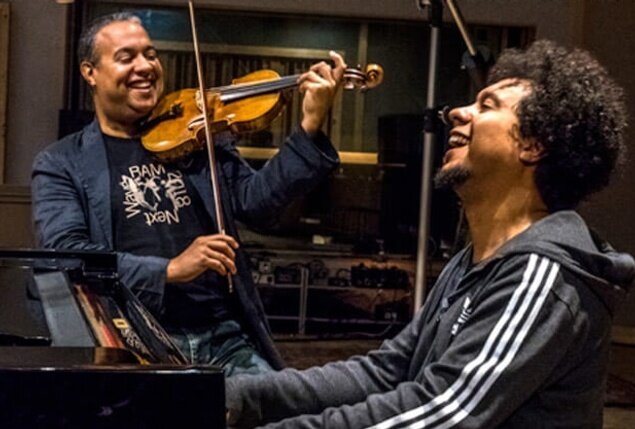Gavilán Brothers Gallivant
JULY 11, 2022
by Stephen Martorella
The Gavilán Brothers, violinist Ilmar with pianist and composer Aldo-López led a fascinating musical odyssey. PBS has just released a film about the brothers called Hermanos (Brothers) who were separated for decades because of the political situation in Cuba and only recently reunited to perform and record together for the first time, arrived in the Breakers on Saturday.
Aldo opened with a World Premiere. Newport commissioned American composer Shawn e. Okpebholo for a piece that reflected some of the history surrounding historic Rhode Island, and that would speak to our time. The result, Okpebholo’s Crooked Shanks, develops a tune of the same name composed in the mid 1700’s by a former slave, Newport Gardner, who resided in Newport. Gardner was born Occramer Marycoo, possibly from Sierra Leone, and at age 14 transported and sold as a slave to Newport ship captain Caleb Gardner, who gave the young Occramer the name Newport, and legally adapted the family name as his own. Gardner was trained in English, French, and music. He purchased his freedom in 1791 and obtain a home in Newport, where he became a music instructor. He composed several tunes, of which Crooked Shanks appeared in books of English dancing-tunes as early as 1768. For more on Newport Gardner click here.

Okpebholo’s free adaptation of Gardner’s tune produced a tone-poem of immense beauty infused with Afro-Cuban flavorings. It was written specifically for Aldo López Gavilán, who performed it with sensitivity and dynamic energy. The Crooked Shanks tune was not easily identified, as its original conception as a dancing tune in 6/8 time was never present. Only the notes of the theme were hinted at, gradually rising out of an impressionistic mist, perhaps reminiscent of a heavy fog out at sea, gradually emerging in the dawn. After a long dramatic pause, the second section began with a primal, rhythmic coursing, evoking in spirit something like Bartok’s Allegro Barbaro but using Afro-American and Cuban infused rhythms, some associated with ‘rag-time’ music, and building in speed and intensity. Some of the phrases took on an improvisatory character, while others became more and more chromatic, until all settled back into the dreamy mists of the opening.
Aldo’s compositions performed by his brother Ilmar on violin and himself on piano formed the balance of the concert. Many of the romantic and nostalgic, themes recalled bygone and heady days of Havana, at times the writing becoming expansive and sweeping, at other times energetic and virtuosic, infused with the timeless rhythms of African inspired Cuban dances and folk music. Aldo is completely at home in both jazz and classical idioms, and a skilled jazz improviser with an impressive technique, all of which fused into the compositions, while Ilmar’s soaring violin rose above the fray with memorable melodies, and at times the brothers executed very rapid passages in unison with exacting precision.
A few songs deserve special mention, Caipiriñame brought us not only the rhythm of Cuba but also of Brazil and the Bossa Nova, with an extended and brilliant piano solo, while Eclypse was an intimate slow jazz ballade incorporating improvisatory elements interwoven within its poignant themes, an expression of the separation the brothers had to endure for a significant part of their lives. Related to that was the song Hermanos, which is also the title of the PBS film about the brothers and the title of their debut album as a duet. Ilmar described this piece as “intimate and soulful.”
Quick Tune contained rhumba rhythms underlying virtuosic violin writing and an exciting toccata-like piano solo, culminating in a unison tour de force finish. This earned one of many standing ovations the brothers received throughout the evening. Several of the works told stories. Momo’s Tale was inspired by a little girl who brought stolen time back, from a children’s novel by German writer Michael Ende, while Viernes de Cuidad depicted a day in London, starting in a Middle Eastern district at dawn, with themes and sounds reflecting the sounds of Persian instruments, which included strumming the fingers across the bass strings with an open pedal to create the sound of a santur (the Middle Eastern equivalent of the hammered dulcimer). Suddenly we find us at midday dancing in the streets of an Irish quarter, and the day concludes with all the bustle of a cosmopolitan city, ending in the pubs of London to the sounds of tunes recalling the Beatles.
The closer, Pan con Timba (Bread with Whatever), offes a humorous look at Cuba today, with remembrances of Old Havana and the unique, complex, and iconic rhythm of Cuban son and salsa music called tumbao. All combined to create an evening of unforgettable memories and melodies.
Original Article appears on:
